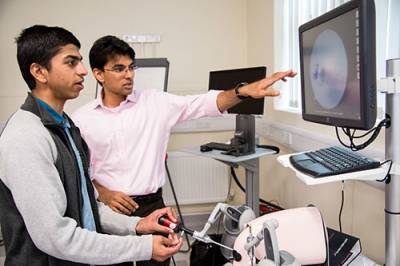Vice-Provost's View: TEF on the horizon and what this means for teaching and learning at UCL
17 November 2016
So, TEF is on its way.
 In January, UCL will be making its submission to the government's new Teaching Excellence Framework, which seeks for the first time to reach a judgement on the quality of student education in England's universities.
In January, UCL will be making its submission to the government's new Teaching Excellence Framework, which seeks for the first time to reach a judgement on the quality of student education in England's universities.
A more immediate concern across the sector, and particularly with students, is the government's insistence on linking TEF outcomes with the ability of universities to raise tuition fees by the rate of inflation.
We have argued, unsuccessfully, that a financial stick is not needed to drive improvements in students' education and their overall university experience. The TEF proposals have been controversial for several reasons. Fundamentally, there is the issue of whether the metrics being used actually measure excellent teaching.
Right now, we are preparing our submission by developing a narrative about the education that we offer to our students, explaining what makes it distinctive and how it exceeds established expectations for teaching quality.
The Education Strategy 2016-2021 was developed with an eye on the tactics needed to be successful in the TEF, but that is not its purpose.
Its purpose is to set how, over the next five years, we will make progress with one of the six principal themes of UCL 2034: to be a global leader in the integration of research and education, underpinning an inspirational student experience.
The strategy was launched last session after extensive consultation. It harnesses the gathering momentum that is changing UCL's education offer.
Alongside major developments in our three flagship initiatives around curriculum reform (Connected Curriculum), the development of staff (UCL Arena) and student engagement (UCL ChangeMakers), it focuses on reconfiguring postgraduate taught education; creating a teaching estate to meet our needs; enriching digital learning; preparing students for the workplace and the world; and personalising student support.
The Annual Student Experience Review
Critical to the student experience is consistently good feedback on their academic work. This is the current focus of the Annual Student Experience Review (ASER) process for all undergraduate and postgraduate taught programmes, alongside teaching and academic support.
ASER, which was developed with an eye on the metrics that will be used in the TEF, brings together each department's data relating to student achievement and experience on each degree programme.
Using these data, departments then submit development plans that they have co-developed with their students for discussion, first by their faculty and then by the Quality Review Sub-Committee of UCL's Education Committee.
In 2015-16, departments received their first-ever mandated actions for incorporation into their plans, this time around assessment and feedback.
In addition, nine departments with the lowest scores in the NSS gained accelerated access to support and resources through the ASER Intensive process, particularly from colleagues in the Centre for Advancing Learning and Teaching (including dedicated ChangeMaker Scholars) and Academic Services.
Six of the nine departments achieved across-the-board improvements in NSS scores - an excellent outcome after just one year. Three departments will stay in the process for a second year.
Since the first ASER process, NSS 2016 showed improvements in teaching (up 1%), assessment and feedback (up 3%) and a 1% improvement in overall satisfaction. This is testimony to a lot of hard work by colleagues across UCL and I am very grateful to everyone for that.

There is much more to do to bring all departments up to the level of our best and this will require continuing effort and commitment.
Growing staff and student engagement
Though improvements in NSS scores are absolutely worth striving for, they don't tell the whole story of what is happening across UCL. Three indicators reveal how colleagues are engaging with the broader education agenda.
Four years ago, fewer than 80 staff participated in the annual teaching and learning conference. Last year, more than 800 participated including, for the first time, student ChangeMakers, who gave plenary presentations.
More than 4,000 staff have engaged with the UCL Arena programme and, in two years, 469 UCL Arena staff development fellowships have been awarded - the fastest rate of growth in the Russell Group.
I could go on. There are great initiatives and inspiring examples of innovative teaching and learning across the institution - please do keep on returning to the Teaching and Learning Portal for fresh case studies and resources.
But back to the TEF. TEF 2017 will measure participating universities at institution level. We make our submission in January 2017 and the results will be known in May 2017.
It is highly likely that future TEFs will dig down to discipline level, determining an aggregate institutional score from those discipline-level scores. Our performance matters, because it is only by maintaining our excellent reputation that we will attract the best minds to our global university.
However, while TEF matters, education should not be about chasing scores. Rather, it is about doing what is right for our students, for their development as critical thinkers and their overall experience at UCL. That's what the Education Strategy, co-developed with students, is all about.
Professor Anthony Smith
Vice-Provost (Education & Student Affairs)
 Close
Close

